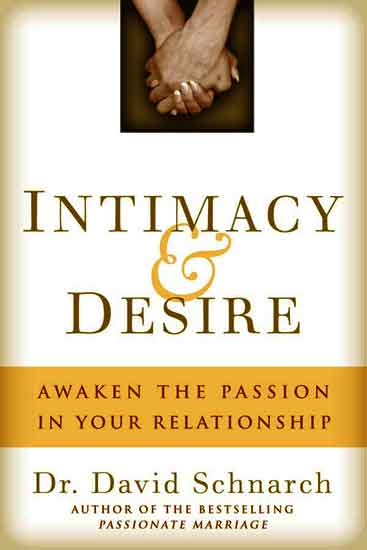


 Heard anything like this in your house lately?
Heard anything like this in your house lately?
- "You think you can touch me any way you want!"
- "Why do we always have to do things your way?!
- "You think I owe you sex because you make more money!"
- "I'm fed up with your needs dictating what we do or don't do!"
- "I don't feel like having sex when you talk to me that way!"
- "I talk to you this way because you never feel like having sex!"
These are the often-unrecognized signs of partners battling out the wars of autonomy, attachment and selfhood. They commonly surface right in the middle of your sexual relationship. You think you're just having sexual desire problems. It doesn't help that your partner may be saying, "It's not about you, I'm just not into sex." Or, "All you want is sex!" Your partner is saying it too: it's about sex. That's what you want to believe too.
But underneath you really know it's about more than sex.To most of us, these are the unmistakable signs of "sexual incompatibility," "sexual chemistry being used up," "falling out of love,"or "irreconcilable differences." You think you're "not into" each other any more. Maybe you think of it as "emotional alienation." Because you're secretly looking underneath the idea it's all about sex, you never consider maybe you're looking at the wrong "underneath." You never consider the problem is you and your partner are so emotionally fused it's keeping you apart. And you never imagine the solution is developing a more solid self.
Four Drives of Sexual Desire
Heretofore, health care professionals have considered three primary drives of sexual desire, each with their own neurotransmitter:
- Lust (horniness) –driven by testosterone.
- Romantic love–driven by serotonin and nor-epinephrine.
- Attachment–driven by oxytocin and vasopressin.
In Intimacy & Desire I proposed there is a fourth "drive" of sexual desire that's never been considered. It not only differs dramatically from the other three drives, it's stronger than the other three combined:
- Our urge to develop and maintain a solid sense of self.
There's a chapter in Intimacy and Desire entitled, "Since Your Self Showed Up Sexual Desire Hasn't Been The Same." It describes how struggling with sexual desire issues pushed human brain evolution, and contributed to the emergence of the human self about 1.6 million years ago. Ever since, human sexual desire and the human self have been thoroughly entangled. You and I struggle through these entanglements today on our way to becoming mature adults. They show up as sexual desire problems that push you to become a more emotionally autonomous adult who isn't dependent on getting a positive reflected sense of self from other. This is known as a solid sense of self.
At least, this is what I believe. This developed from working extensively with couples with sexual desire problems, and when couples embrace this view it helps them make impressive gains. I've found the same in my personal life.
Selfhood: Strongest drive of human sexual desire
Picture this: You've met someone who thinks you're wonderful, attractive, and clever. You're in love. You day-dream about the sex you've been having together. You're brain is bathed in testosterone, serotonin, and norepinephrine 24 hours a day, with intermittent doses of oxytocin or vasopressin. You haven't had sex in a month and you've got blueballs or womb hunger. Your partner is on the way over and you're ready for action.
Your partner walks in three hours late, without a word of explanation of explanation or apology. You are expected to go on as if there's nothing strange about this. When you're a little taken aback, your partner says you're making a big deal out of nothing, you're ruining the time you have together and maybe the two of you need a good screw.
Still ready for action? I doubt it. Issues of selfhood take over. These include:
- How you feel about how you're being treated.
- How you think your partner sees you.
- How much you take this personally.
When it comes to human sexual desire, issues of selfhood usually trump horniness, hormones, and attachment. Once you understand what's going on, you're less likely to over-react or get defensive, and more likely to handle sexual desire problems better.
My next column will take this discussion further.
The eBook version of Intimacy & Desire is now available on Amazon.com and elsewhere. Print versions of Intimacy & Desire and other books by Dr. Schnarch are available at our online store.
Couples Enrichment Weekends based on these precepts are scheduled throughout the year. Read more here.
For a nice overview of my approach, read the post "How To Grow Up" by Pam Weintraub or "Lust For The Long Haul" by Elizabeth Devita-Raeburn.
© 2011 by Crucible Institute. All rights reserved.
